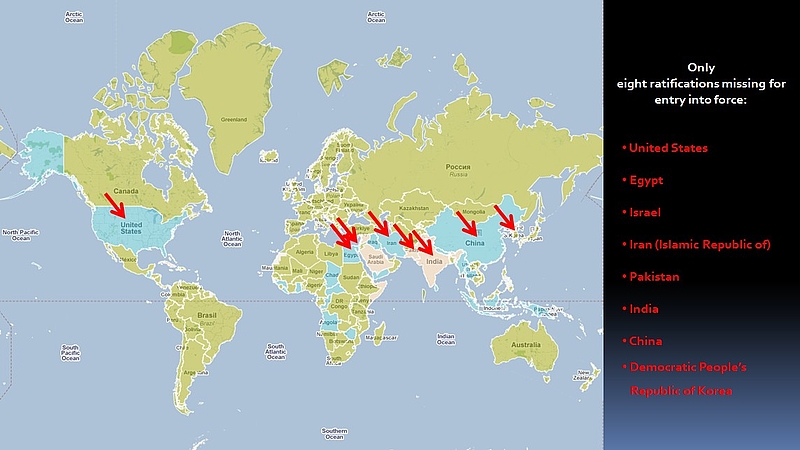By Thalif Deen
UNITED NATIONS (IPS) – The Comprehensive Nuclear-Test-Ban Treaty (CTBT), which was adopted by the U.N. General Assembly back in 1996, has still not come into force for one primary reason: eight key countries have either refused to sign or have held back their ratifications.
The three who have not signed – India, North Korea and Pakistan – and the five who have not ratified — the United States, China, Egypt, Iran and Israel – remain non-committal 19 years following the adoption of the treaty. JAPANESE | SPANISH | SWEDISH | TURKISH
When the United Nations last week commemorated International Day Against Nuclear Tests, Secretary-General Ban Ki-moon appealed once again to all remaining States – especially the eight holdovers — to sign and ratify the Treaty as “a critical step on the road to a nuclear-weapons-free world.”
Currently, there is a voluntary moratoria on testing imposed by many nuclear-armed States.
“But moratoria are no substitute for a CTBT in force. The three nuclear tests conducted by the Democratic People’s Republic of Korea (North Korea) are proof of this,” Ban said
The warning comes amidst reports Tuesday that North Korea has re-started its programme to produce nuclear weapons.
But chances of all eight countries coming on board in the not-too-distant future are remote, says John Hallam of the Human Survival Project (HSP) and People for Nuclear Disarmament (PND), a joint project between PND and the Centre for Peace and Conflict Studies at the University of Sydney, Australia.
“I think it is most unlikely that the recalcitrant 8 states will sign and ratify by 2016,” Hallam told IPS.
They include the United States itself, which though has signed, he said, but the Republicans have made it very clear they will not ratify..
Hallam said this also includes both India and Pakistan who have made it clear they have no intention of either signing or ratifying – “least of all, India under current Prime Minister Narendra Modi (although the nuclear disarmament movement in India has over the years advocated signature and ratification of the CTBT for India).”
Finally, he said, it includes China and one or two others who say they will ratify as soon as the United States has done so.
At a high-level panel discussion last week to commemorate International Day Against Nuclear Tests, Ban said: “The goal of ending nuclear tests has been a leading concern throughout my diplomatic career. “
As Secretary-General, and depository of the Comprehensive Nuclear-Test-Ban Treaty, “I have made achieving a legal ban on nuclear testing a personal priority.”
He said he has been to Semipalatinsk in Kazakhstan, the site of 456 tests, including some of the largest in history.
“I have met with victims of nuclear tests. I have witnessed the lasting societal, environmental and economic damage nuclear tests have caused.”
Since the first test in New Mexico 70 years ago, he pointed out, the world has endured over two thousand nuclear tests. Those tests devastated pristine environments and local populations around the world.
Many have never recovered from the legacies of nuclear testing – including poisoned groundwater, cancer, birth defects and radioactive fallout, he noted.
“The best way to honour the victims of past tests is to prevent any in the future,” he declared.
The CTBT is a legally-binding, verifiable means by which to constrain the quantitative and qualitative development of nuclear weapons.
Hallam told IPS over 1100 nuclear tests were carried out by the United States in Nevada, Alaska, the Marshall Islands, other parts of the Pacific, and in outer space.
Tests carried out in Nevada resulted in large-scale contamination of downwind inhabitants and large-scale morbidity.
He said the largest ever U.S. test was the 15Megaton Castle Bravo test, which contaminated the crew of the Japanese fishing boat Lucky Dragon, bringing about an agonizing slow death from radiation sickness, and contaminating the Marshall Islands.
The largest nuclear test ever was carried out by the Soviets in the early ’60s in Novaya Zemlya, a large island above the arctic circle, and known as ‘Tsar Bomba’ (King of Bombs), he noted.
At 60 megatons, it vaporized the sacred hunting grounds of the Nenets people, sent fallout right around the world and caused the planet to ring like a bell with seismic shock for hours.
Hallam said the Soviets carried out around 800 nuclear tests, many of them at the Semipalatinsk test site, and causing widespread radioactive contamination with catastrophic effects on local populations.
In addition, nuclear tests have been carried out by the UK, (many of them in Maralinga and Emu Field, Australia), France (Algeria and the Pacific), China (Sinkiang), India (Pokhran, Rajasthan) Pakistan (Baluchistan), and the North Korean, French, Chinese, and British tests have all inflicted radiation-based disease and death on local populations and participants.
Nuclear testing is the backbone of nuclear arms-racing and proliferation. A resumption of nuclear testing, or the conducting of a new nuclear test by any country – including the DPRK – helps to inch the world toward an abyss into which we hope it will never go, Hallam said.
The best way to halt proliferation and nail down a ‘no nuclear testing’ norm is for the Comprehensive Test Ban Treaty, which outlaws nuclear testing, to come into force, he declared.
Meanwhile, President Nursultan Nazarbayev of Kazakhstan has launched an international Project, called ATOM (the acronym for Abolish Testing. Our Mission), a worldwide e-campaign, calling on world leaders to end nuclear tests, once and for all. (IPS | 16 September 2015)
Original <> http://www.ipsnews.net/2015/09/nuke-test-ban-treaty-still-in-limbo-u-n-complains/




